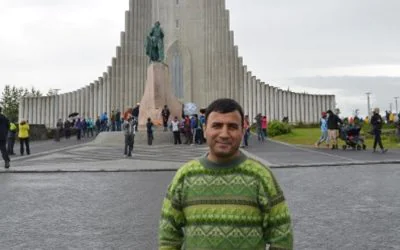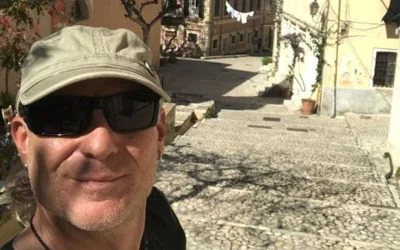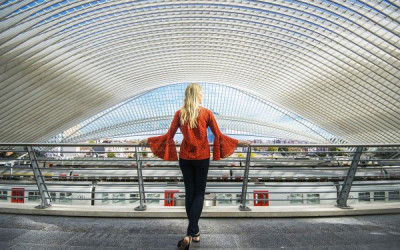There are tourists, there are travellers, there are country collectors and then there is Felix. This incredible 22-year old is a first-class adventurer; surprisingly, he has yet to become hugely known in the traveller community, but our interview with him today may change that…

Eagle hunting in Kyrgyzstan
Felix, tell us a little about your early days and your background.
I was born in Germany but moved around a fair bit as a child, going back and forth between Germany, the US and Switzerland. With family on both continents I was lucky to travel from a young age. However what really started waking my interest in travel was my love for nature. When I wasn’t out catching frogs or getting lost in forest, I spent days reading maps, books or anything that would get me closer to what seemed like the impossibly distant reaches of Africa, Latin America and Asia. A true game changer was a 3-week trip to Madagascar when I was 16, where I took part in a university research program dedicated to studying the Fosa. Weeks in the jungle working hard everyday not only dramatically built up my resilience, but taught me a lot about making friendships on the road. And pretty much like that I was hooked, setting off on my first solo trips to Latin America, Central Asia and Africa at 18. At the moment I am studying in Australia.
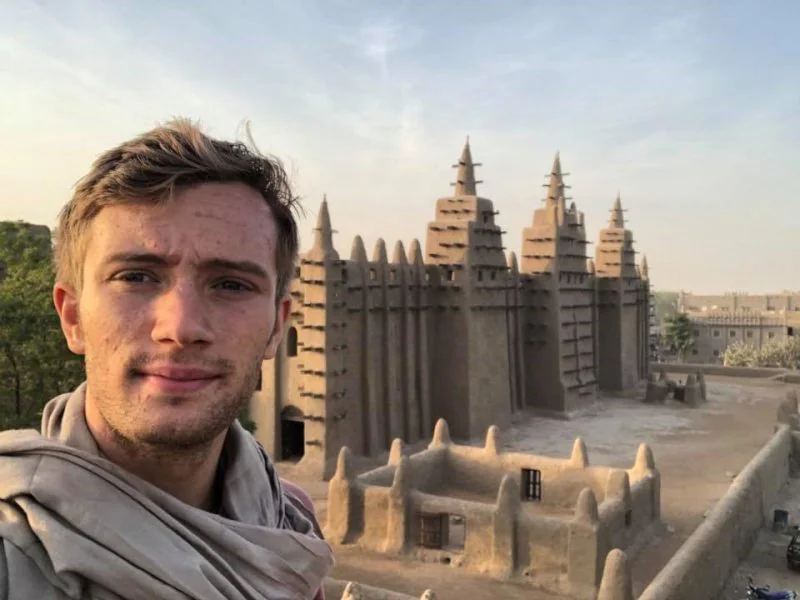
Djenne, Mali
You are from Switzerland which is hardly the most adventurous place. How Swiss do you feel? How does your environment (friends, family) see your travels? And do you believe Switzerland is unjustly stereotyped?
While I don’t have a Swiss passport (yet), it definitely is still the place that feels most like home. What it lacks in adventure and excitement Switzerland definitely makes up for in quality of life and natural beauty. One of the best things about Switzerland is that its central location, great public transport and surprisingly cheap flight connections make it a great base to explore Europe and the Middle East. The Swiss love to travel, and I think that definitely carries through the culture. Where else do they advertise trips to Uganda, Iran and Turkmenistan at Aldi (a budget supermarket)! While the stereotype is true that not much happens in Switzerland, a lot of people definitely underestimate how strange the country can be. Only in Switzerland do two cantons (states) still hold national elections by raising hands in a public square. Throw in some strange pagan traditions and pockets that still speak an ancient form of Latin as their first language and it can be a lot more interesting than it lets on.
While my family and friends might not share my enthusiasm for some of the world’s harder destinations, they have generally been incredibly supportive. When things go wrong, I know I can always count on them.
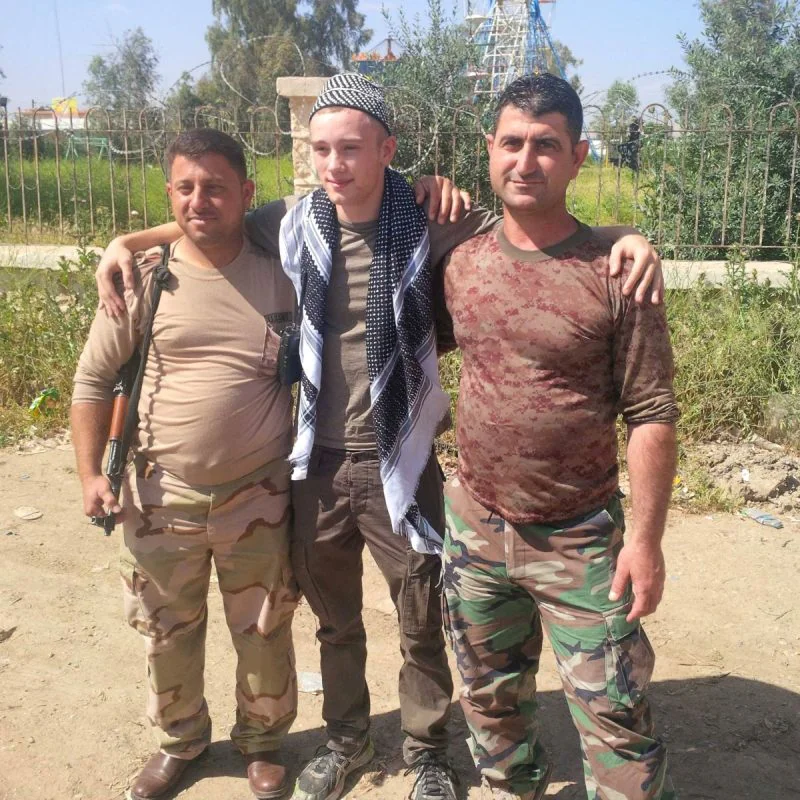
Spending the day without a visa in Bartella, Iraq, a guest of the Assyrian militia
To finish with Switzerland, tell us of a few gems in your country that few people will be aware of.
For such a small country that gets so many visitors, it’s amazing how easy it is to escape the crowds in Switzerland. Less than 2 hours by train from Zurich, but devoid of visitors, Canton Uri offers some of the country’s best mountain scenery. One of the country’s three founding “Waldstätte“ (“Forest Cantons), Uri remains fiercely traditional and its not uncommon to see people still wearing traditional clothes or impromptu Alphorn performances. Hiking up from the southern tip of Lake Lucerne, it’s also easy to see Marmots and Chamoix, which tend to avoid the more well trodden hikes. Another place that’s often overlooked is Schaffhausen. In the far north this is one of Switzerland’s best-preserved medieval cities, with a great location on the banks of the Rhine near Europe’s largest waterfall.
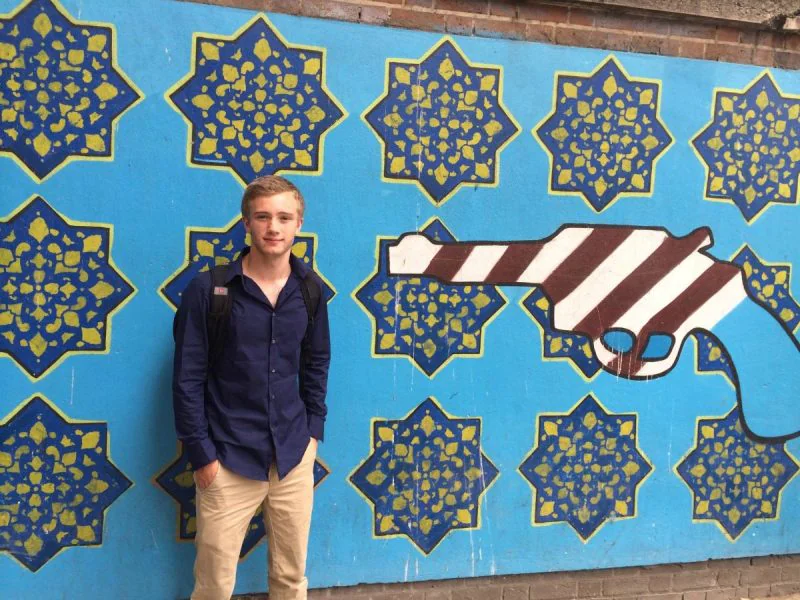
Tehran, Iran
Now, you travel far and wide. What are your aims with travelling? Do you feel travel has changed you and if so, how?
Why I travel and what I hope to get out of it is something I get asked a lot, but that I often have difficult time answering. Since I first started planning trips it was never really about ticking boxes, and I think the biggest motivation has just been the urge to see new things. However as I have begun to reflect on travel more, I find that individual trips often have diverse and often specific aims. Sometimes it might be to fulfill a childhood dream like visiting Dzangha Sangha. Or it might be to reconnect with nature or clear my head in a new environment. But more often than not I still think what drives me most simply a passion to explore.
Travel has definitely changed me. One of the biggest things that’s comes from travel at a young age is how quickly you learn that the world exists in more than just black and white. Interacting with people from different backgrounds and beliefs, definitely made me question many of my preconceived notions. On a more practical level I think travel, especially solo travel is a great exercise in self-reliance. Not only does it allow you to find your boundaries, but also it gives you so many chances to push them further.
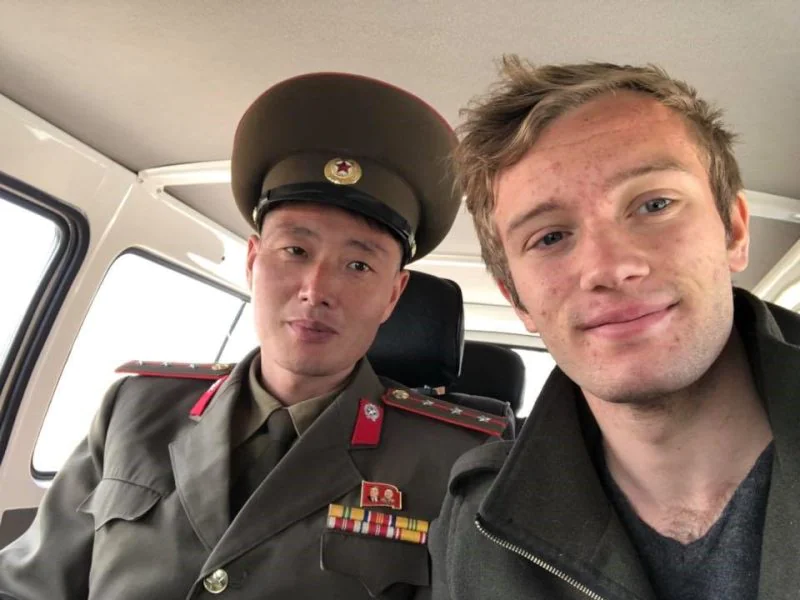
Where else? North Korea
You are really adventurous, having been to Kandahar and Agadez recently. With so few visitors to these places, tell us a little about them, how you were received there and your feelings when you were visiting.
Agadez and Kandahar are two cities that always exuded a great draw for me, and in both cases I was unable to visit them on my first trips to Niger and Afghanistan respectively.
Spiritual capital of the Taliban, stronghold of Southern Pashtun culture and home of some of the world’s best pomegranates Kandahar is an intoxicating mix of all the good and bad in contemporary Afghanistan. Form the moment you step off the plane in Kandahar things are just a bit different. In contrast to the grey monstrosity that is Kabul Airport, Kandahar’s airport is bizarrely pleasant. With open walk ways, beautiful architecture, and even an internal garden with live peacocks (!?), is almost enough to make you ignore the predator drones taking off across the runway. Travelling in Kandahar is difficult and remains by and large extremely dangerous. Mosques and even a shopping center still bear Mullah Omar’s name, and the atmosphere remains tense. Yet while the Taliban remain more prominent here than in any other large Afghan city, locals welcomed me with open arms. From a shopkeeper who turned out to be an ex-military translator on the run from Helmand, to the dean of Kandahar University, and the soldiers who thought my DSLR was a bomb, everyone was proud to show their city’s history and culture. With history dating back to Alexander the Great and a unique culture distinct from any Pashtun areas I had previously visited like Jalalabad, Kandahar turned out to be an Afghan highlight. Unfortunately, the security situation is still so bad I would not consider returning for the time being.
Agadez is also one of those mythical cities I had almost given up on visiting in the near future. However, when I found myself in Northern Nigeria the temptation was too strong not to try. A couple days later, with a visa in hand I flipped my whole Africa trip to make the long overland trip up to Agadez and on to Niamey. Like Timbuktu and Djenne, Agadez rose to fame as one of the Sahara’s great trading cities. A fact reflected to this day in stunning adobe architecture and a fascinating mix of cultures. Dominated by the Tuaregs, many men still carry takouba (traditional swords) and adorn themselves with protective charms. While travel warnings, restrictions and attacks have essentially eliminated any tourism, residents are proud to share their city. Old buildings and guesthouses are lovingly maintained, and the city and its outskirts are full of hidden gems you’ll only discover by getting lost. Staying with a host family I was privileged to meet talented musicians for an informal gig and even got to take part in a traditional pre-wedding ceremony in the foothills of the Air Mountains.
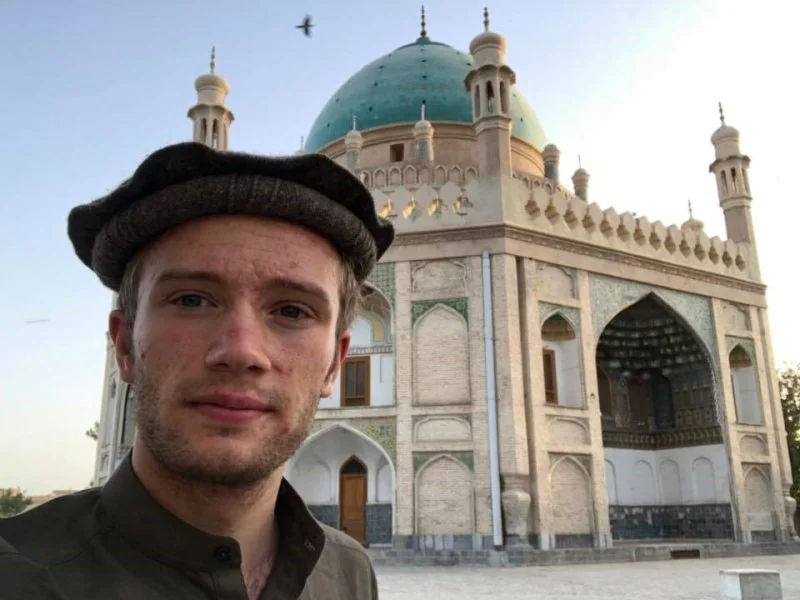
Kandahar, Afghanistan
You were arrested and jailed in Syria recently. Tell us about that and about Syria in general. If you knew what would happen, would you still want to go?
Unfortunately what seemed to be shaping up to be a wonderful visit to Syria was dramatically interrupted last November when I was falsely charged with espionage and imprisoned for five days. While exploring old Damascus I came upon one of the many ruined suburbs. Unsure if it was closed or open (many battle damaged suburbs have been cleared of hazards and are slowly coming back to life, but some remain off-limits due to their strategic value or remaining hazards like unexploded rockets) I tracked down a solider to ask for permission. Regrettably this spurred a chain of events that saw me shuttled from base to base before I ended up in a general’s office. While no one had seemed concerned with my intentions or photos, as time continued someone decided to check on my security clearance.
At this point it seemed to become apparent that the security clearance (required for visa issuance) was incomplete or blank. This suddenly became a point of concern worsened when my sponsor refused to clarify the situation or vouch for my status as a tourist. Long story short this ended up with me being driven hooded and handcuffed to a secret military prison where I was formally arrested and interrogated.
Locked up in solitary, I was kept separate from the hundreds of other prisoners at the facility and in the first days was subjected to aggressive and hostile interrogation techniques. However while food and compassion was scarce on the ground at first, I was slowly able to plead my case that I was indeed innocent. To cut a long story short the situation had escalated up to higher tiers of the Syrian state and with intense scrutiny I couldn’t simply be released. Finally after five harrowing days, I was acquitted by a judge (I was permitted no contact with anyone but the secret police during the ordeal, and never even heard the formal charges till after I was released).
While the situation (and the frequent jokes about how easy it would be to shoot and dispose of me) was incredibly distressing, I feel it came down to the product of a series of unfortunate events. While I feel this experience will make my risk assessments even more diligent, I knew the risks and felt comfortable with the plans I had made. Would I go back to Syria again? Probably not right away, but I will definitely be back at some point. Up until I was arrested, and as soon as I had convinced my captors of my innocence I only had positive experiences with the Syrian people. Damascus is an incredible city that should be on everyone bucket list. While many people will decide now is not the time to go, the population yearns to move past the war and I think it wont be too long before things improve.
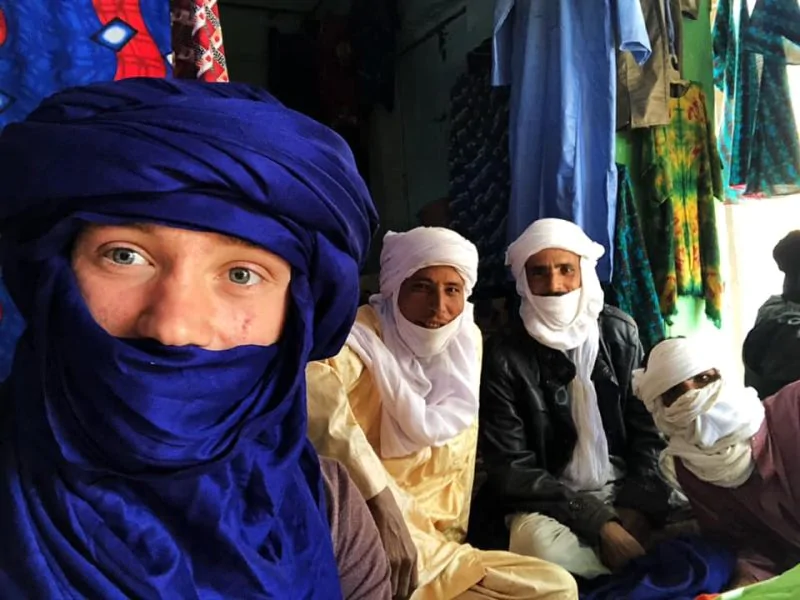
Agadez, Niger
So of all your adventures and experiences so far, which ones have had the largest impact on you?
While its hard to single out just a few impactful experiences, one that comes to mind right now would be riding the iron ore train in Mauritania. Mauritania was a somewhat spontaneous addition to a month-long Africa trip in 2016, and the chance to ride the iron ore train was one of the biggest appeals. While quite a few people had written about the experience, nothing prepared me for just how beautiful it was. Between the enjoying the stars above, watching the Polisario communicate with flashing lights in the desert, and interactions with the other passengers, the 12h almost went by too quickly. One of the things that stuck with me most was speaking to a young migrant in my container, who told me about his life and plans to head to Algeria and then by boat to Europe. It really put the struggles and inconveniences I had on that trip into perspective. While it wouldn’t be the last time I was moved by an encounter or experience, that ride really managed to draw together so much I had experienced on that first formative solo trip to Africa.
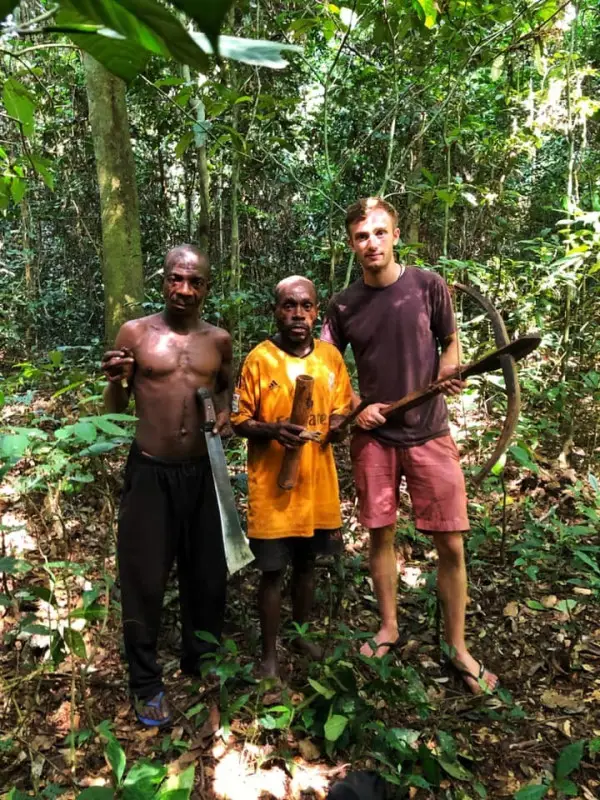
Crossbow hunting with the Bayaka pygmies in the Central African Republic
You are only 22. What are your travel aims for the next few years? Do you believe you will still be travelling intensely in 10 years, say, or do you think you will settle down?
While I very much hope to visit every country one day, I haven’t set myself a firm timeframe or anything. While I hope to keep travelling as much as possible, a big reason I have been able to do so much has been because of the flexibility offered by university. As I move into a longer-term career or further study I know I won’t have as much time. However I don’t think I will ever be done travelling, and hope to continue doing so intensely for as along as possible. One big change I am hoping for is to be able to have more remote expedition type trips, (eg. to Antarctica or the Yamal Penninsula) that are beyond my student budget.
You travel mainly alone. Why do you prefer this? Do you ever get lonely? And do you feel you are sacrificing something by travelling or not?
While I am generally a very social person, solo travel is by far my favorite way to go. I feel travelling solo makes it much easier to fully connect and engage with a destination. Not only can you focus fully on everything around you, but being alone gives you that much more of a push to get out of your comfort zone. On that note, it’s never really lonely on the road. Whether it’s other travellers or friendly locals there is always someone to interact with on the road. However as much as I love meeting new people there is something special about the freedom that comes with being completely independent. On the other hand there are definitely sacrifices that come with frequent travel. Its all to easy to miss family events, important moments between friends at home or even just a job or opportunity you hadn’t seen coming. Travel takes up not just a lot of time, but also energy and other resources like money that often require sacrifices.
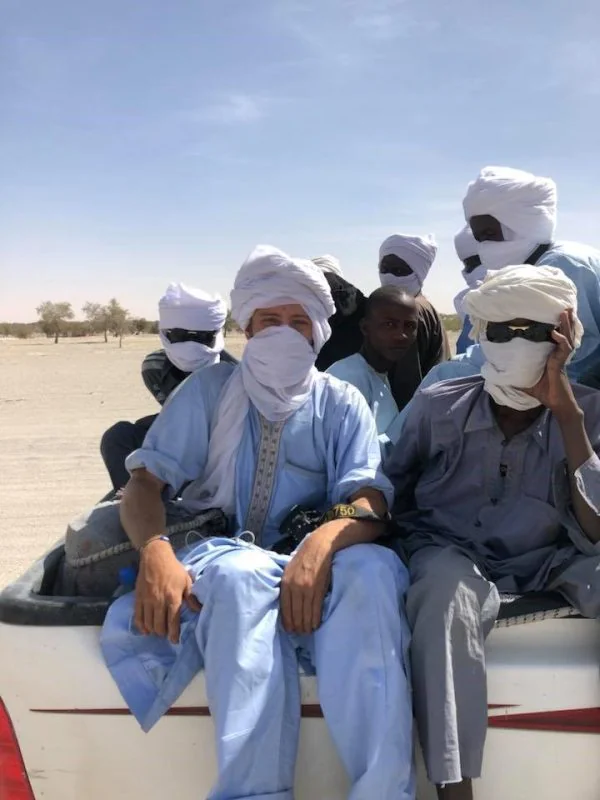
Hitch-hiking somewhere near Mao, Chad
You are now living/studying in Australia. Why did you opt for this? What are your impressions from down under? Any culture shock or aspects of life there that surprised you?
There has always been something that drew me to Australia. Visiting Australia as part of my father’s work was the earliest long-haul trip I can remember and definitely left an impact on me as a child. From the unique animals, the vast and at times brutal landscapes and people Australia always fascinated me. Yet I never really thought about moving to Australia till it came to look at universities. As soon as I saw Australia offered the exact double-degree program I was looking for, my mind was made up. While my family wasn’t thrilled about the distance, I was excited to start somewhere new. Australia had the added bonus of getting me close to a whole new part of the world. Before moving to Australia I never knew much or had a strong in interest in East Asia, but with cheap flights and strong cultural connections turned my layovers into a real interest in the region. Being this close to the South Pacific has been another added benefit, with trips to Kiribati, Vanuatu and Papua New Guinea introducing me to a passion for snorkeling and spear fishing.
While the Australian way of life is unique, I never really felt any culture shock coming from Europe to Canberra. However I recently visited Aurukun, an extremely remote aboriginal community in the Gulf of Carpentaria, which highlighted many of Australia’s complexities easily forgotten if you stay on the east coast. Behind all the similarities and the easy-going attitude I still find it fascinating to see the evolving relationship between Australia’s European, Indigenous and Asian sides.
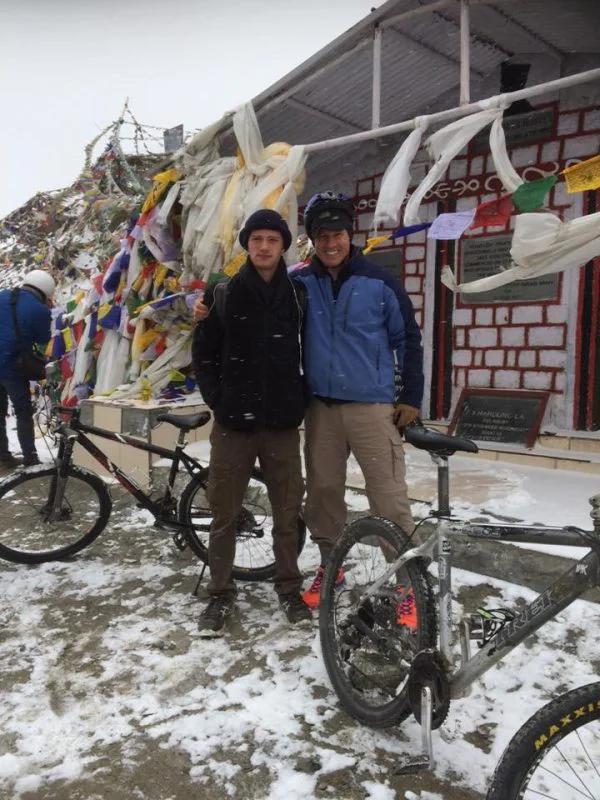
Mountain-biking with my dad down the world’s highest motor road, Ladakh, India
So where can we find you in the next few months?
At the moment I don’t have any trips planned, and am focusing on completing my honors thesis at university. However I am hoping to visit South America this summer, which remains the biggest blank space on my map. Beyond that I am also looking into some more trips in Asia and the Pacific.
Finally, our signature question – if you could invite any 4 people from any time in human history to dinner, who would you invite and why?
Bruce Conde – A World War Two veteran who renounced his US citizenship to head up the philatelic office in the Mutawakkilite Kingdom of Yemen, was expelled from Yemen, became stateless, returned to Yemen rising to the rank of Army general before becoming stateless again. All the while claiming false connections to various European royal families. A man with a life story so strange you couldn’t even make it up.
Richard Francis Burton – fluent in 29 languages, I have always found Burton to be one of the interesting explorers.
Steven Mcurry – as a lover of photography Mcurry’s work has always been an inspiration.
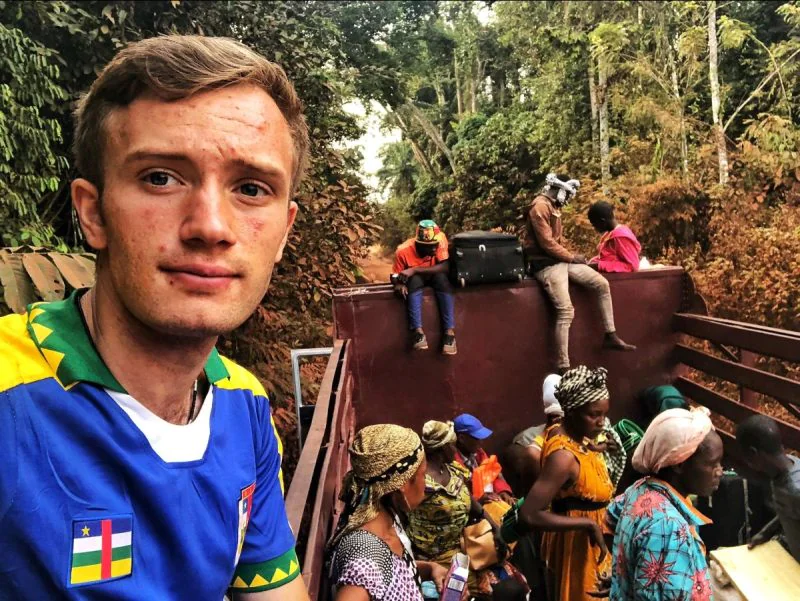
Hitch-hiking from Bangui to Dzangha Sangha, Central African Republic
The photos in this interview are from Felix’s personal collection and we thank him for sharing his images with us here at NomadMania!
